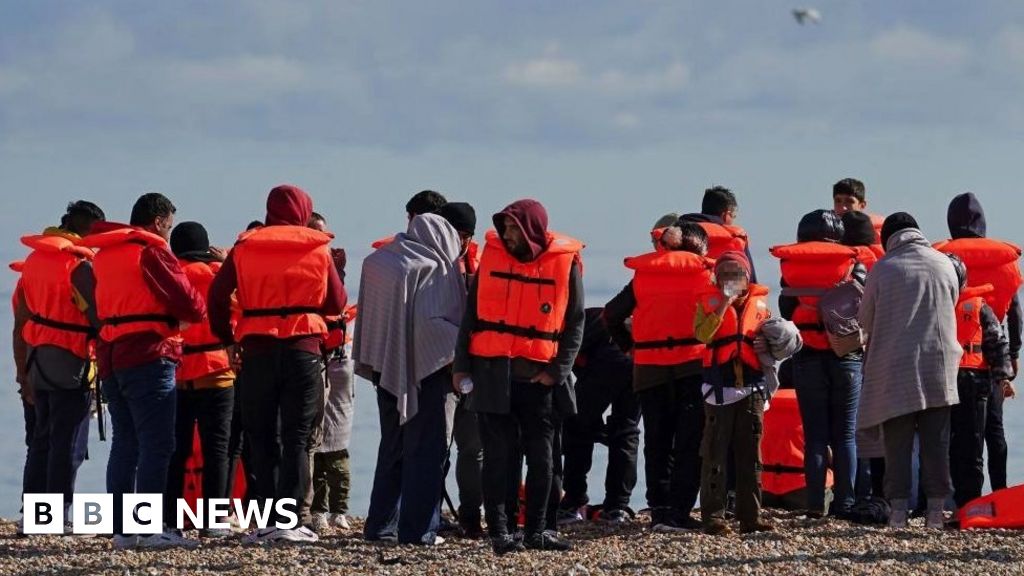
- Written by Sam Francis
- Political correspondent, BBC News
Legal challenges led to the first flight to Rwanda being canceled shortly before take-off in June 2022
Rishi Sunak's flagship Rwanda Bill faces its first test as debate begins in the House of Lords.
Peers, including the Archbishop of Canterbury, have criticized the principles of the bill, while the Liberal Democrats are seeking to kill it entirely.
The move is expected to fail, but peers have indicated they will try to strip key powers as the bill advances.
The government's plan aims to stop legal challenges against sending asylum seekers to Rwanda.
Last week, their peers defeated the scheme when they called for a UK-Rwanda treaty to be postponed until Kigali improves its asylum procedures.
Key votes on the legislation are not expected in the House of Lords until next month, but any changes made by peers are likely to be overturned by the House of Commons.
The government hopes to operate flights to Rwanda by spring.
So far, 66 speakers have put forward their names to speak at the debate to be held on Monday.
“Bad” bill.
Archbishop of Canterbury Justin Welby said the bill “harms” the UK's reputation, “national unity” and asylum seekers “who need protection”.
He added that this bill “obfuscates the fact that all people, including asylum seekers, have great value.”
The Archbishop said he would not vote against the bill at second reading, but told peers that the UK “can do better”.
Former Labor Home Secretary Lord David Blunkett described the bill as “shoddy and less than this country deserves”.
Lord Blunkett said the Rwanda bill fails to achieve its main aim because it “punishes” asylum seekers, not smuggling gangs.
Lord Blunkett said that in order to stop boat smuggling, Britain needed to “mobilize” by securing borders, processing claims and striking new deals with the French.
But Conservative Lord Hannan, a former member of the European Parliament, said the bill was “imperfect” but part of a “package of measures” that would act as a deterrent and reduce demand for illegal immigration to the UK.
Former Conservative Chancellor Lord Clarke said he would not support the bill, saying it would put the UK constitution at risk.
He added that declaring Rwanda a safe country “attempts to overturn” the facts reached by the Supreme Court, which ruled that the country is unsafe for asylum seekers. He added that the government could also rule that “all dogs are cats.”
Crossbench peer and prominent barrister Lord Carlisle said there was “plenty of evidence that Rwanda is not a safe country” and that the government was “asking us to legislate a lie”.
The former independent reviewer of terrorism legislation said he would only support the bill if concerns raised by his peers about Rwanda's asylum procedures were resolved.
Ahead of the debate, Downing Street insisted that the Rwanda Bill was “the right thing to do”.
The Prime Minister's official spokesman said: “This bill is a key part of how we stop the violent criminal gangs that target vulnerable people and have led to so many deaths in the English Channel.”
“It is also the fair thing to do for taxpayers and for those individuals seeking to come here via safe and legal routes who are seeing their place jumped by those who can afford to cross on small boats.”
The Prime Minister managed to pass the bill through the House of Commons after the failure of the Conservative rebellion.
Sunak said deporting some asylum seekers to Rwanda would act as a deterrent to migrants seeking to reach the UK by crossing the Channel in small boats, but Labor described the plan as an expensive “gimmick”.
The debate over the legislation has exposed ongoing divisions among conservatives – leading to two vice presidents, Lee Anderson and Brendan Clarke Smith, resigning from their positions in order to vote in favor of the rebel amendments.
In the final round of voting in the House of Commons on 18 January, more than 60 Conservative MPs backed rebel amendments to allow the UK government to ignore parts of human rights law when sending people to Rwanda.
Dozens of Conservative MPs have indicated that they are willing to abstain or even vote against the entire bill without substantive changes.
However, in the event, only 11 MPs voted against it, including former Immigration Secretary Robert Jenrick and former Home Secretary Suella Braverman.
The votes were the culmination of months of Tory infighting and coincided with an opinion poll funded by an anonymous group called the British Conservative Alliance – which predicted that Labor was on track to gain a 120-seat majority.
Conservative pollster Lord Hayward called on the Electoral Commission to consider polls conducted by groups that have no reliably identifiable “beneficial owner”.

“Travel specialist. Typical social media scholar. Friend of animals everywhere. Freelance zombie ninja. Twitter buff.”





More Stories
Taiwan is preparing to face strong Typhoon Kung-ri
Israel orders residents of Baalbek, eastern Lebanon, to evacuate
Zelensky: North Korean forces are pushing the war with Russia “beyond the borders”